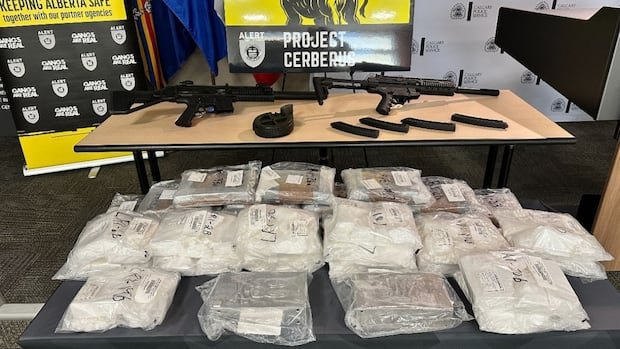The Alberta Law Enforcement Response Teams (ALERT) have dismantled a cross-border drug operation linked to Mexican cartels and confiscated what they describe as their largest-ever cocaine seizure. The operation, known as Project Cerberus, commenced in May 2023 and concluded recently with the collaboration of RCMP, Calgary police, and the U.S. Drug Enforcement Administration.
ALERT revealed that the network sourced cocaine from Mexican cartels, transported it through the United States, and distributed it across Canada from British Columbia to Ontario. Five individuals from Alberta, two from Calgary and three from Edmonton, have been apprehended and are facing a total of 31 charges related to organized crime, drug offenses, money laundering, and conspiracy.
An additional suspect, from Edmonton, was initially arrested in October 2024 when authorities discovered 96 kilograms of cocaine in a residence in Houston. ALERT disclosed that he was involved in transporting the drugs through the U.S. for distribution in Canada and has since been sentenced to over 11 years in a U.S. federal penitentiary.
Alongside the arrests, law enforcement officials seized 157 kilograms of cocaine with a potency ranging from 96% to 98%, estimated to be valued at over $15 million on the streets. They also confiscated 15 firearms, close to one million dollars in cash, and seven vehicles equipped with concealed compartments.
The first batch of seized cocaine was found hidden in a vehicle compartment by Manitoba RCMP, containing 61 kilograms of the drug near Richer, Manitoba, in March 2024. Sgt. Matt Pumphrey, an RCMP officer assigned to Calgary ALERT, highlighted the discovery of these compartments equipped with sophisticated hydraulic systems as a significant find during the investigation.
Experts like Kelly Sundberg, a former Canada Border Services Agency officer now teaching criminology at Mount Royal University, noted that concealing drugs in vehicle compartments is a common tactic. Sundberg emphasized the need for continuous availability of drug-sniffing K-9 units and X-ray scanning technology at all entry points to enhance border security and potentially save lives.
While acknowledging the success of the operation, experts such as Temitope Oriola, a criminology professor at the University of Alberta, cautioned that criminal networks are adaptable and may persist despite significant busts. Oriola described these networks as complex and multifaceted entities, praising the joint efforts of law enforcement in Canada and the U.S. while underscoring the potential for ongoing criminal activities by such syndicates.

